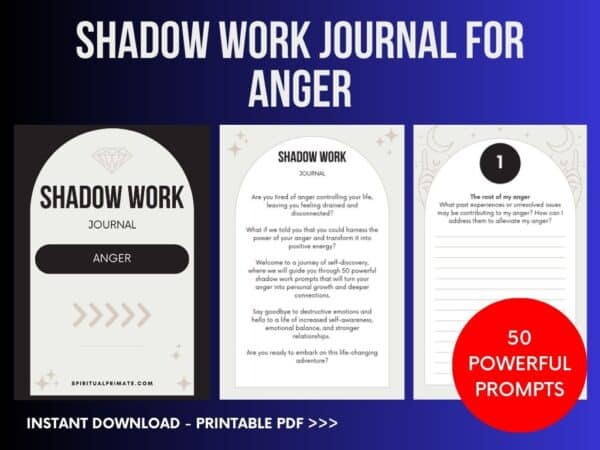Are you tired of anger controlling your life, leaving you feeling drained and disconnected?
What if we told you that you could harness the power of your anger and transform it into positive energy?
Welcome to a journey of self-discovery, where we will guide you through 50 powerful shadow work prompts that will turn your anger into personal growth and deeper connections.
Say goodbye to destructive emotions and hello to a life of increased self-awareness, emotional balance, and stronger relationships. Are you ready to embark on this life-changing adventure?

Exploring Anger
Anger is a natural and universal emotion experienced by humans in response to perceived threats, injustice, or frustration. It serves as a psychological alarm system, alerting us to potential harm or unfairness and propelling us into action to protect ourselves or assert our rights. Although often viewed negatively, anger can have positive aspects, such as motivating us to create change, set boundaries, or express our needs and emotions more effectively.
However, when anger becomes chronic or uncontrolled, it can lead to negative consequences, damaging relationships, impairing judgment, and causing physical and mental health issues. Understanding the root causes of anger and learning how to harness its power for personal growth is essential to achieving emotional balance and fostering healthier, more fulfilling relationships. By exploring the intricacies of anger, we can transform this often-misunderstood emotion into a catalyst for positive change and self-improvement.

Utilizing Shadow Work to Transform Anger into Personal Growth
Anger, as a natural and universal emotion, plays a significant role in our lives. Although it can serve as a psychological alarm system, chronic or uncontrolled anger can lead to negative consequences. However, there is a powerful self-discovery tool that can help transform anger into personal growth and deeper connections – shadow work. In this article, we will explore the concept of shadow work and its role in addressing anger issues, ultimately leading to a more balanced emotional state and healthier relationships.
Shadow Work: Understanding the Concept
Shadow work is a psychological practice derived from Carl Jung’s theory of the “shadow” – the unconscious aspect of our personality that we often hide or deny. This hidden side of ourselves contains repressed emotions, desires, and fears, including anger, which we may not be aware of or choose to suppress. Shadow work involves identifying, acknowledging, and integrating these shadow aspects, allowing us to gain a greater understanding of ourselves and our emotions.
The Connection Between Shadow Work and Anger
Anger often stems from unresolved emotional issues or unmet needs, which may be buried in our shadow. By working with our shadow, we can uncover the root cause of our anger and gain valuable insights into why we react the way we do. This process helps us become more mindful of our triggers and patterns, enabling us to make conscious choices and respond to anger-inducing situations more effectively.
Steps to Apply Shadow Work for Anger Management
1. Self-reflection: Begin by observing your anger and identifying patterns or situations that trigger it. Reflect on your feelings and ask yourself what the underlying cause may be. Are there any unresolved issues or unmet needs that are contributing to your anger?
2. Journaling: Writing about your emotions can be a powerful tool for self-discovery. Record your thoughts, feelings, and experiences related to your anger. This practice can help you uncover hidden emotions and reveal your shadow aspects.
3. Meditation and mindfulness: Mindfulness meditation is a valuable practice for becoming more present and aware of your thoughts and emotions. As you become more mindful, you can better recognize your anger triggers and learn to respond more constructively.
4. Acceptance and integration: Embrace your shadow aspects and acknowledge the role they play in your life. Accepting and integrating these hidden parts of yourself can help you achieve emotional balance and reduce the intensity of your anger.
5. Seek professional guidance: If you’re struggling with anger or the shadow work process, consider seeking support from a mental health professional. A therapist or counselor can provide valuable guidance and help you navigate the complexities of shadow work.
Shadow work is a powerful tool for transforming anger into personal growth and deeper connections. By identifying, acknowledging, and integrating the hidden aspects of our personalities, we can gain a greater understanding of ourselves and our emotions. This self-awareness enables us to manage our anger more effectively, fostering emotional balance and healthier relationships. Embrace the journey of self-discovery through shadow work and unlock your potential for personal growth.

Shadow Work Prompts for Anger
1. The root of my anger: What past experiences or unresolved issues may be contributing to my anger? How can I address them to alleviate my anger?
2. Anger triggers: What specific situations, people, or events commonly trigger my anger? How can I become more aware of these triggers and better manage my reactions?
3. The emotion beneath the surface: What other emotions might be hiding beneath my anger, such as fear or sadness? How can I explore and acknowledge these underlying emotions?
4. Anger expression: How do I typically express my anger? Is it through aggression, passive-aggressiveness, or internalizing it? How can I find healthier ways to express my anger?
5. The physical manifestation of anger: How does my body react when I feel anger? What physical sensations can I notice and use as a cue to address my anger?
6. The consequences of anger: How has my anger affected my relationships, career, and overall well-being? What can I do to repair any damage caused by my anger?
7. My anger role models: Who in my life displays healthy anger management techniques? What can I learn from them?
8. The purpose of my anger: How has anger served me in the past, and is it still serving a purpose in my life? Can I find new ways to fulfill that purpose?
9. The anger iceberg: What beliefs, values, and expectations might be fueling my anger from deep within? How can I uncover and challenge these root causes?
10. Anger as a boundary: How has anger helped me establish boundaries in my life? Can I maintain these boundaries in a healthier way?
11. The anger scale: On a scale of 1-10, how intense is my anger typically? What factors contribute to this intensity, and how can I regulate it?
12. Anger and communication: How does my anger affect the way I communicate with others? How can I improve my communication to avoid escalating conflict?
13. The power of forgiveness: Can I practice forgiveness towards those who have angered me? How might this help me release my anger?
14. Identifying patterns: Are there any recurring themes or patterns in the situations that trigger my anger? What can I learn from these patterns?
15. Anger and self-compassion: How can I practice self-compassion when dealing with my anger? How might this change my experience of anger?
16. Anger in relationships: How does my anger impact my relationships with friends and family? How can I work with my loved ones to manage my anger better?
17. The anger time capsule: How has my anger evolved over time? Can I identify any specific events or periods in my life that significantly influenced my anger?
18. The anger narrative: Can I create a story about my anger, exploring its origins, development, and potential resolution?
19. Anger and vulnerability: How might my anger be connected to feelings of vulnerability? Can I learn to embrace vulnerability without resorting to anger?
20. The anger spectrum: How does my anger compare to others’? Are there any aspects of my anger that are unique to me?
21. Anger and control: How does my anger relate to my feelings of control or powerlessness? Can I learn to accept situations that are beyond my control?
22. The anger journal: Can I maintain a journal to track my anger, documenting triggers, intensity, and coping strategies?
23. Anger and empathy: How can I practice empathy towards those who trigger my anger? Can understanding their perspective help me manage my anger?
24. The anger mantra: Can I create a personal mantra to recite when I feel angry, reminding me of my commitment to managing my anger?
25. Anger and stress: How does stress contribute to my anger, and what can I do to reduce stress in my life?
26. The anger detox: Can I commit to a period of time without expressing anger, instead focusing on understanding and addressing its root causes?
27. Anger and assertiveness: How can I express my needs and desires assertively, without resorting to anger?
28. The anger mirror: How might I be projecting my anger onto others, and how can I take responsibility for my own emotions?
29. Anger and self-awareness: How can I increase my self-awareness to better recognize and manage my anger?
30. The anger toolbox: What tools and techniques have I found most effective in managing my anger? How can I build upon these strategies?
31. Anger and meditation: Can I incorporate mindfulness meditation into my daily routine to help manage my anger?
32. The anger playlist: Can I create a playlist of music that helps me process and release my anger?
33. Anger and gratitude: How can I cultivate gratitude in my life, even when I feel angry?
34. The anger experiment: Can I try different approaches to managing my anger, evaluating their effectiveness and adjusting my strategy accordingly?
35. Anger and sleep: How does my sleep quality affect my anger levels? Can I improve my sleep to help manage my anger?
36. The anger body scan: Can I practice a body scan meditation to connect with my physical sensations when I feel angry?
37. Anger and creativity: Can I channel my anger into creative pursuits, such as writing, painting, or dancing?
38. The anger time-out: Can I implement a “time-out” strategy when I feel angry, allowing myself space to cool down and reflect?
39. Anger and nature: How can spending time in nature help me process and release my anger?
40. The anger support network: Can I build a support network of friends, family, or professionals who can help me manage my anger?
41. Anger and perspective: How can I shift my perspective to see the bigger picture when I feel angry?
42. The anger ritual: Can I create a ritual to help me process and release my anger, such as burning a symbolic object or writing a letter to my anger?
43. Anger and exercise: How can physical activity help me manage my anger?
44. The anger challenge: Can I challenge myself to a period of time without expressing anger, instead focusing on understanding and addressing its root causes?
45. Anger and visualization: Can I use visualization techniques to imagine a calmer, more peaceful reaction to situations that typically trigger my anger?
46. The anger affirmation: Can I create a positive affirmation to recite when I feel angry, reinforcing my commitment to managing my anger?
47. Anger and breathing: Can I practice deep breathing exercises to help calm my body and mind when I feel angry?
48. The anger timeline: Can I create a timeline of my anger, tracing its origins, development, and potential resolution?
49. Anger and humor: How can I use humor to diffuse tense situations and lighten the mood when I feel angry?
50. The anger breakthrough: Can I embrace my anger as an opportunity for growth and personal transformation?
Congratulations! You have explored 50 powerful shadow work prompts designed to help you transform anger into personal growth and deeper connections.
As you continue your journey, remember that self-awareness is the key to unlocking your true potential. By embracing your anger and diving deep into your emotions, you have taken a bold step towards a more balanced and fulfilling life.
Now, as you move forward, we leave you with a thought-provoking question: How will you continue to use your newfound understanding of anger to strengthen your relationships and promote personal growth?
Dive Deeper Into Your Shadow Work Journey
- Product on sale
 Printable Shadow Work Journal for Anger [PDF]Original price was: $11.98.$5.99Current price is: $5.99.
Printable Shadow Work Journal for Anger [PDF]Original price was: $11.98.$5.99Current price is: $5.99. - Product on sale
 50 Shadow Work Prompts for Anger | Printable PDFOriginal price was: $5.98.$2.99Current price is: $2.99.
50 Shadow Work Prompts for Anger | Printable PDFOriginal price was: $5.98.$2.99Current price is: $2.99.

